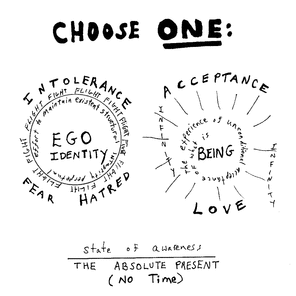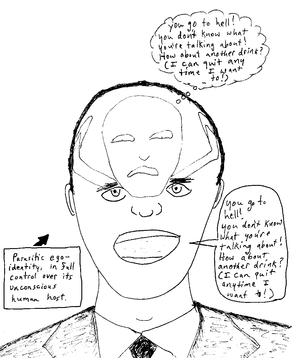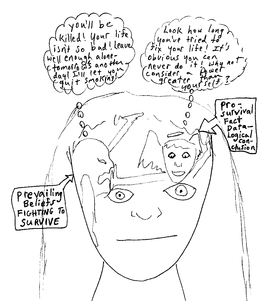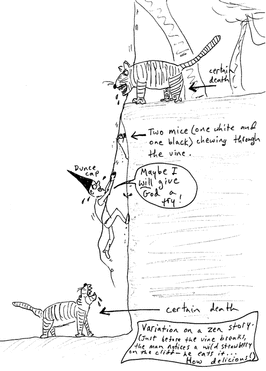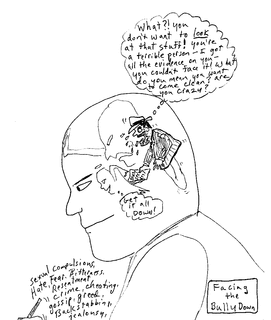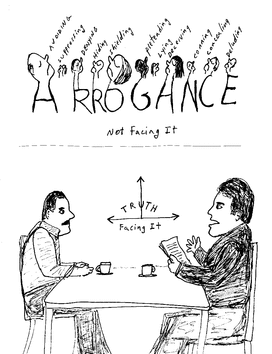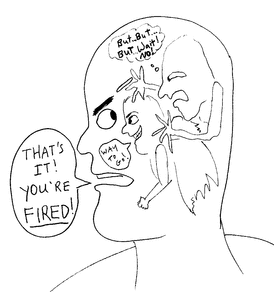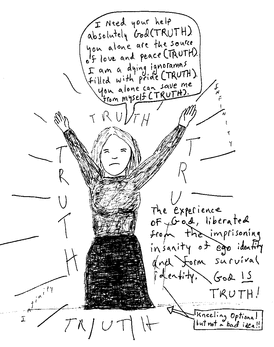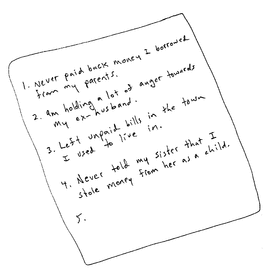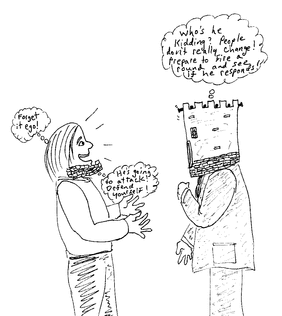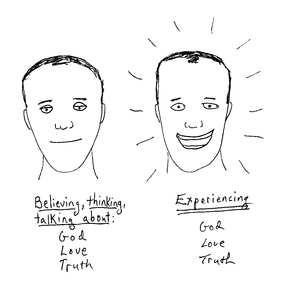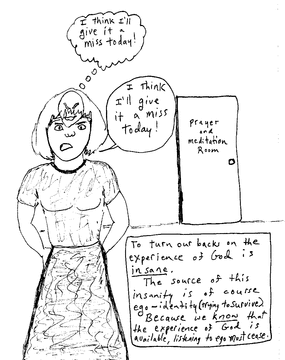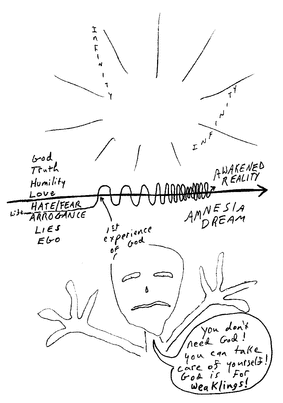Humans Anonymous
The original version of The Game of God had a chapter entitled “Humans Anonymous." This has been removed from the revised version (published 2014); Here are the text and cartoons as they appeared in the original edition.
|
We have shown that the primary survival identity of human beings is the ego-identity, and that human beings primarily survive as their ego-identities. To survive as ego-identity means to be perpetually and reflexively obedient to the flight/fight commands of the ego-identity. To survive as ego-identity means to be dominated by ego-identity.
We have also shown that love is the only alternative to flight/fight survival, and that as long as we are identifying with ego-identity the best we can expect are rare, brief, and involuntary experiences of love. Only by willfully renouncing the ego-identity (ceasing to identify with it) can we ever attain love volitionally. |
|
Two questions present themselves: how do I renounce my ego-identity and what would life look like without it?
We will address the first question in this chapter. “How do I renounce my ego-identity?” The approach we recommend is based upon the inspired twelve-step recovery program of Alcoholics Anonymous. We are just as helplessly enslaved by our ego-identities as alcoholics are by alcohol. In fact, ego-domination is the source of alcoholism, drug addiction, and all human suffering. Practicing these steps sincerely will initiate and escalate the awakening process. These twelve steps are the essential framework for self-liberation. Other paths are available but they must include the heart of these twelve steps in order to be effective. These steps are the essence of all true spiritual paths. The first and crucial step requires that we face the pain and the hopelessness of ego-domination (if you don’t think you’re dominated by your ego-identity, go back and review), and admit the exact nature of the problem. Step One: We admitted that we were powerless over our ego-identities, that our lives had always been unmanageable. |
|
The next step requires us to see that if love (mental health) is our goal, then we must cease to be ego-dominated. As long as we identify with ego, ego-identity will interpret our attempts to renounce it as killing “ourselves.” To prevent its “death,” ego-identity will try to convince us that it can “fix itself.” Ego-identity can never “fix itself” to the point of being able to produce love/sanity, because love does not come from ego-identity. Love must come from a source other than the body, mind, or personality.
Step Two: Came to believe that a power greater than ourselves could lead us to sanity. |
|
The Higher Power cannot be another “form” (person, group, or object—real or imagined), because all form is bound to survive and therefore cannot be the source of love which leads one to sanity.
The Higher Power cannot be intellectually reduced to any specific thing, or understood by a definition. The Higher Power must be free of the limitations of form-identity in order to be considered “higher” (otherwise it is just another surviving form). The Higher Power must be Being, free of a survival identity…which is our definition of experience. The Higher Power is pure experience. We use the word “God” because we are all familiar with it. We should never imagine that using the word God (or Buddha, Allah, etc.) means that we understand God. Understanding blocks experience. We only understand God to the degree that we experience God, and we are experiencing God to the exact extent to which we are experiencing love. Step Three: Made a decision to turn our will and our lives over to the care of God as we understood God. |
|
Now that we have made this decision to turn our lives over to God, we need to prepare to take this great step. We can only be strengthened in our resolve to turn our will and our lives over to God by knowing exactly what it is we are “turning over.” This means facing the cruel truth of what our lives look like under “our” management…under ego-domination. Step Four: Made a searching and fearless moral inventory of ourselves as ego-identity-dominated creatures. |
|
What we are working on is the process of attaining humility—a setting aside of our arrogant lies: that we know what we are doing, that we are satisfied with the way we are, and that we don’t need help from anyone. Humility is achieved by sufficiently experiencing the truth: that we don’t know what we are doing, that we are not satisfied with the way we are, and that we are desperately in need of help. Step Five: Admitted to God, to ourselves, and to another human being the exact nature of our ego-identity-dominated behavior. |
|
In order to take the next step, we must be experiencing true contrition (one reason for the importance of communicating to another human being). We must feel that our pride is broken. We must see our lives as such disasters that the pain of staying as we are is intolerable. We must experience the pain of our ego-identity-dominated behavior to the point of overcoming the fear and the embarrassment of sincerely calling upon the unknown for relief. This will be the only step of blind faith we will ever need to take. After this, our faith will be backed up by experience.
Step Six: Were entirely ready for God to replace our ego-identities as the director of our lives. |
|
This step is the Main Event. If, after taking this step, we do not have the undeniable experience of the presence of God (the experience of liberation from ego-identity), it simply means that we did not really take the step (we did not take it with true humility, which means we did not relinquish our ego-identities…we need to go back and tell more truth). Step Seven: Humbly asked God to assume full control of our lives. |
|
If we have followed the first seven steps with humility and sincerity, we have now made undeniable experiential contact with God. This experience has proven the existence of a reality vastly superior to that which we have known under ego-identity.
Ego-identity, naturally, is entirely threatened by this event, and will do everything in its power to regain control. The purpose of the next two steps is to break up our old patterns of behavior. First, by having us face our ego-controlled past and clean up the messes we made. Second, by recreating the experience of humility to counter ego’s inevitable attempts to destroy our new-found relationship with God. To face and take responsibility for our past is to experience forgiveness for our past—thus robbing our ego-identities of their blackmailing power over us. Step Eight: Having had a spiritual awakening, we became ready to make amends for our ego-identity-dominated behavior. Made a list of all persons we had harmed, and became willing to make amends to them all. |
|
Now we take our list and make it real in the world. We know we are carrying out this step with sincerity when we experience love for those on our list (no matter what response we receive from them). Step Nine: Made direct amends to such people whenever possible, except when to do so would injure them or others. |
|
The first seven steps could actually take place in a matter of minutes, or over a much longer period of time. The point is that the experience is equally valid. What is extremely important to realize is that the experience of God’s presence is not a one-time event. It is merely the first taste of awakening from the amnesiac dream.
Be assured that the dream will reassert itself. The ego-identity dream’s favorite way of lulling its host back to sleep is to take the experience of God and make a surviving belief system out of it. The next two steps are devoted to recreating the experience of God in our daily lives. Step Ten: Continued to take personal inventory and when we were wrong promptly admitted it. |
|
Beware the pitfalls of intellectualism and belief. Just as the experience of love should not necessarily lead to sex or marriage, so the experience of God should not necessarily lead to adherence to any particular religious doctrine.
Also beware ego-identity’s advice that you can “do it on your own.” The support of, and accountability to, others is helpful: consider forming a Humans Anonymous support group. Our entire focus should be on spending more and more time in the experience of God—in the awakened state. Loving ourselves and others in the only proof we have that we are waking up. Step Eleven: Sought through prayer and meditation to improve our conscious contact with God as we understood God, praying only for God’s will for us and the power to carry that out. |
|
This last step means living in love. If we are not living in the experience of love, we are not living in the experience of God, we are living under the domination of our ego-identity. It is just that simple.
The responsibility which accompanies our awakening is two-fold: 1. to share our awakening with those who still slumber in their pain, and 2. to never delude ourselves that we are in any way superior to them. Step Twelve: Having had a spiritual awakening as the result of these steps, we tried to carry this message to ego—identity-dominated human beings, and to practice these principles in all our affairs. |
Alcoholics Anonymous Disclaimer
We wish to thank Alcoholics Anonymous for the use of the 12 steps. Here are the 12 steps in their original form:
1. We admitted we were powerless over alcohol—that our lives had become unmanageable.
2. Came to believe that a Power greater than ourselves could restore us to sanity.
3. Made a decision to turn our will and our lives over to the care of God as we understood Him.
4. Made a searching and fearless moral inventory of ourselves.
5. Admitted to God, to ourselves, and to another human being the exact nature of our wrongs.
6. Were entirely ready to have God remove all these defects of character.
7. Humbly asked Him to remove our shortcomings.
8. Made a list of all persons we had harmed, and became willing to make amends to them all.
9. Made direct amends to such people wherever possible, except when to do so would injure them or others.
10. Continued to take personal inventory and when we were wrong promptly admitted it.
11. Sought through prayer and meditation to improve our conscious contact with God, as we understood Him, praying only for knowledge of His will for us and the power to carry that out.
12. Having had a spiritual awakening as the result of these Steps, we tried to carry this message to alcoholics, and to practice these principles in all our affairs.
The twelve steps are reprinted with permission of Alcoholics Anonymous World Services, Inc. Permission to reprint and adapt this material does not mean that A.A. has reviewed or approved the contents of this publication nor that A.A. agrees with the views expressed herein. A.A. is a program of recovery from alcoholism—use of the steps in connection with programs and activities which are patterned after A.A., but which address other problems, does not imply otherwise.
We wish to thank Alcoholics Anonymous for the use of the 12 steps. Here are the 12 steps in their original form:
1. We admitted we were powerless over alcohol—that our lives had become unmanageable.
2. Came to believe that a Power greater than ourselves could restore us to sanity.
3. Made a decision to turn our will and our lives over to the care of God as we understood Him.
4. Made a searching and fearless moral inventory of ourselves.
5. Admitted to God, to ourselves, and to another human being the exact nature of our wrongs.
6. Were entirely ready to have God remove all these defects of character.
7. Humbly asked Him to remove our shortcomings.
8. Made a list of all persons we had harmed, and became willing to make amends to them all.
9. Made direct amends to such people wherever possible, except when to do so would injure them or others.
10. Continued to take personal inventory and when we were wrong promptly admitted it.
11. Sought through prayer and meditation to improve our conscious contact with God, as we understood Him, praying only for knowledge of His will for us and the power to carry that out.
12. Having had a spiritual awakening as the result of these Steps, we tried to carry this message to alcoholics, and to practice these principles in all our affairs.
The twelve steps are reprinted with permission of Alcoholics Anonymous World Services, Inc. Permission to reprint and adapt this material does not mean that A.A. has reviewed or approved the contents of this publication nor that A.A. agrees with the views expressed herein. A.A. is a program of recovery from alcoholism—use of the steps in connection with programs and activities which are patterned after A.A., but which address other problems, does not imply otherwise.

